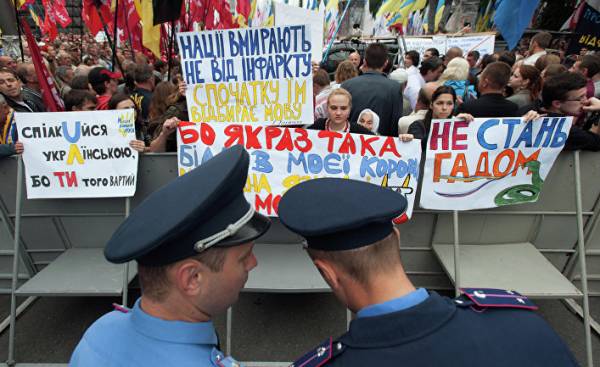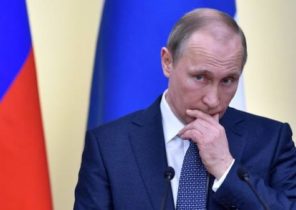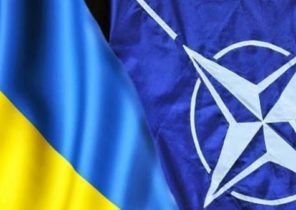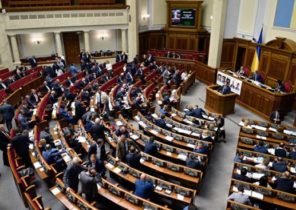
At the end of may the Verkhovna Rada of Ukraine adopted the law with the florid name “About modification of some laws of Ukraine concerning the language of broadcasting of the audiovisual (electronic) mass media”. Although changing the essence only one article of the law on television and radio broadcasting, the consequences will affect those 87% of people who used to get information about what is happening in the country on television.
In October this year, all national broadcasters in Ukraine will be obliged to broadcast in the Ukrainian language at least 75% of the weekly airtime. For local television and radio stations, the quota was reduced to 60%. For TRK indigenous Ukrainian broadcasting quota is only 30%. Broadcasting without duplication is permitted if the report is from the event; also, quotas do not apply to the speech of the guests in the Studio and indigenous peoples.
For violation of the law provides a penalty of 5% of the total amount of the license fee. However, it is not considered a violation of broadcast programs and films produced in the USSR until August 1, 1991, and displays throughout the year, the Russian-language production created or purchased by television companies until the law came into force.
The adopted law can not be called innovation, since during 2006-2012 Ukraine has acted rules to guarantee broadcasting in the Ukrainian language 75% of the daily broadcasting time of TV channels and radio stations. Then it was just a General rule. She was supposed to interpret and monitor the implementation of a special regulatory body, the national Council on television and radio broadcasting.
However, in 2012 this provision abolished the so-called “law Kolesnichenko-Kivalov” — “On principles of state language policy”. From March 2014 to may 2017 because of the appeal of this law in the constitutional court and prospects for its complete abolition, the question of the choice of the broadcast language is almost not regulated.
About this issue for the first time openly declared by the President Petro Poroshenko at the meeting with representatives of the Ukrainian Diaspora in August 2016, “passing Hello” to the owners and top managers of some TV channels. “Gentlemen, the share of Ukrainian language You have prohibitively small. And before exercise of the legislative initiative, offering to remember the conscience and self-regulation”, — said the head of state.
The President had in mind, first of all, the popular TV channel “inter” and “Ukraine”, the owners of which were formerly among the closest allies of Viktor Yanukovych and now remain at the helm of the largest opposition parliamentary faction of the Opposition bloc.
Both channels do broadcast mainly in Russian. This is confirmed held in February 2017 monitoring of the national Council. On all national TV channels of the group “inter” (inter, K1, K2, NTN, Enter film), the share of Ukrainian broadcasting on average did not exceed 37%, and on the main — “inter” — up almost 26%.
Meanwhile, according to the Razumkov Center, in 2016 the Ukrainian language is considered native 69% of the population, and Russian — 27%. At home Ukrainian talking 55%, in Russian — 41%.
On the other hand, the claims of the existing linguistic imbalance in media Express and experts on ethno-linguistic issues in Ukraine. According to the chief researcher at the Institute of political and ethnic studies of NAS of Ukraine Volodymyr Kulik, bureaucrats, TV channels don’t do everything necessary to support the state language. “If they use the Ukrainian language, the “bad time” not in Prime time, and at night, or in the news, and not in the TV series or talk show, and even invite the leading Russian language”, — he said.
Director of the Institute of Ukrainian language of NAS of Ukraine, doctor of Philology Pavel Gritsenko went even further, calling the Russian language by means of linking the peoples of the USSR into a single unit, which used the Communist party and the KGB. “They knew it, and so their heirs with the FSB know exactly what the role of the Russian language, as well as using the doctrine language in the struggle for the preservation of subordination and dependence from the Kremlin all the former republics of the USSR”, — expressed the opinion Gritsenko. Despite this, the expert says that language quotas on TV — about ends and means. “If we quoteroom language, songs in the national language, and another time give the Russian, the thus — subconsciously — send listeners, viewers, on space of Russia, turn them into Russian (albeit second class), with all the components of the “Russian world”,” — said Gritsenko.
Meanwhile, critics of language quotas on TV channel “inter” claimed that “the issue in relation to human rights” and that quotas infringe “the rights of millions of Ukrainian citizens for whom Russian language is native”. In addition, according to the channel, the implementation of the law will lead to a drop in the popularity of Ukrainian TV. “It is impossible to create in the right amount of quality content in the Ukrainian language or in the same amounts to make a good dubbing — hence deteriorate the quality of the television product in the Ukrainian language. The capacity of the Ukrainian television market does not allow to create multi-genre high-quality Ukrainian product in the volumes required by the law… many viewers alternative viewing channels that they want, through the Internet platform and the satellite,” reads the statement of the channel.
Experts, analyzing trends in the TV and TV channels, do not agree with any of the above interested parties of the extremes. According to Ulany Feshchuk, Deputy head of the national Council on television and radio broadcasting, the law is unlikely to affect the viewing, as virtually all in Ukraine understand Ukrainian language. “When there had been a quota of 75%, I knew all the TV share of viewing is not exactly fell. In fact, people started to speak Ukrainian”, — she said. Besides, reminded Feshchuk, quotas 50/50 for regional TV channels will allow where there is demand, enough to broadcast programmes in other languages.
Executive Director of the Independent Association of broadcasters Kateryna myasnykova also does not believe that the law will hurt Ukrainian television and will lead to the outflow of the audience. However, she agrees that the changes are for the better will affect channels with a significant share of Russian-speaking viewers, such as “inter”. While Myasnikov indicates that it could be worse. “I am convinced that for the effective implementation of the law required a transition period. Namely transition, and not when the process just dragged on and stalled. But if you compare with other initiatives, where it was 100% Ukrainian language and brand were discriminated against by the rights of national minorities, this has the potential of compromise and effectiveness”, she said.
However, it is possible that in the adopted law there is another side. The authors of the bill — MP Victoria syumar and Mykola knyazhytsky, not only in known media personalities in Ukraine, but also the team members of the “popular front” — the political power of ex-Prime Minister Arseniy Yatsenyuk and Secretary of the national security and defense Council (NSDC) Alexander Turchinov.
It is from the bowels of the security Council had the idea to ban Russian social network. And Victoria siumar were active advocate such a rigid policy. And Mykola knyazhytsky in March 2014 proposed to legislate the creation of a new state on the basis of private ownership of inter.
Investigative journalists of “the Ukrainian truth” also expressed interest in the leadership of the popular front in gaining control over the opposition inter, allegedly with the help of the courts, military pressure and support of one of the former shareholders of the former head of the SBU Valery Horoshevskogo.
Thus, there is a danger that concern about the Ukrainian language can be simply used by politicians as a means of dealing with opponents, and to seize the property of others under the pretext of fighting with “agents of influence” of Russia. And though there is reason to believe that the impact on TV could really take place, the use of the Kremlin’s methods of lies and legalized violence for the capture and retention of power can also be considered an act of sabotage against the Ukrainian state.






